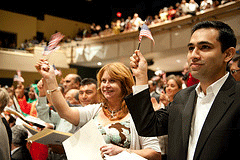
That’s more than half the budget for the City of Chicago and nearly 10 percent of the entire GDP of the Miami-metro area. Across the U.S., if the 8.8 million eligible legal permanent residents became citizens, they’d provide a $50 billion boost to the national economy over the next ten years, according to the Center for the Study of Immigrant Integration at the University of Southern California.
In other words, citizenship is a major economic asset, both for individuals and our local economies, and access to naturalization resources for those who qualify is a powerful tool for community development.
The list of reasons is long.
Immigrants are 30 percent more likely to start a business compared with U.S.-born counterparts, creating jobs and often revitalizing neighborhoods. Already, more than 40 percent of Fortune 500 companies have been founded by immigrants or their children, and immigrants accounted for almost half of the overall growth of business ownership in roughly the past decade. As legalized citizens, immigrants are likely to earn more, have access to more resources to grow their businesses, and can establish stronger ties with communities.
For immigrants who are employees, an economic gap is also present. Almost half of immigrants arriving in the United States with a bachelor’s degree or higher work in jobs that don’t match their specialized skills and training, at a time when employers are struggling to locate candidates with the right skill sets.
The economic case is also supported by demographics: There were 10 million immigrants in the U.S. in 1950, a number that quadrupled by 2010, based on data compiled by Audrey Singer at The Brookings Institution. For example, foreign born residents in New York comprise more than one-third of the city's total population–that's equal to the entire population of Chicago. Moreover, nine metropolitan areas have experienced an unexpected doubling of their foreign-born population in the last decade: Scranton, Indianapolis, Louisville, Knoxville, Birmingham, Jackson, Cape Coral-Fort Myers, Little Rock, and Nashville-Davidson. These cities would benefit from the economic bounce citizenship provides. Better integration of legal permanent residents could increase their earnings by up to 11 percent.
And let’s not forget the financial security citizenship adds to our urban economies. Foreign-born citizens are much more likely to have a bank account that provides them with financial security than non-citizens. In fact, less than 5 percent of foreign-born citizens are unbanked compared to about 23 percent of non-citizens. Something important happens in that transition to citizen.
For all these reasons, we need to make it far simpler for eligible candidates to overcome the language, financial, administrative and information barriers stopping them from applying for citizenship. The $680 cost, when combined with legal and exam preparation costs, is prohibitive for the 52 percent of legal permanent residents who are low-income.
Cities for Citizenship Initiative, launched by Mayor Rahm Emanuel of Chicago, Mayor Eric Garcetti of Los Angeles and Mayor Bill de Blasio of New York with Citi, National Partnership for New Americans, and the Center for Popular Democracy, aims to overcome these obstacles.
Cities for Citizenship enables cities to deliver financial counseling, legal support, application guidance, naturalization test preparation, and other assistance that is essential for permanent residents, who pay taxes and work lawfully, to become citizens.
So far, 11 additional cities have joined the alliance. We look forward to more additions in the coming months. The nation’s economy will be stronger as a result of these efforts.
(Photo credit: Flickr, US Department of Labor, CC BY 2.0)






Comments